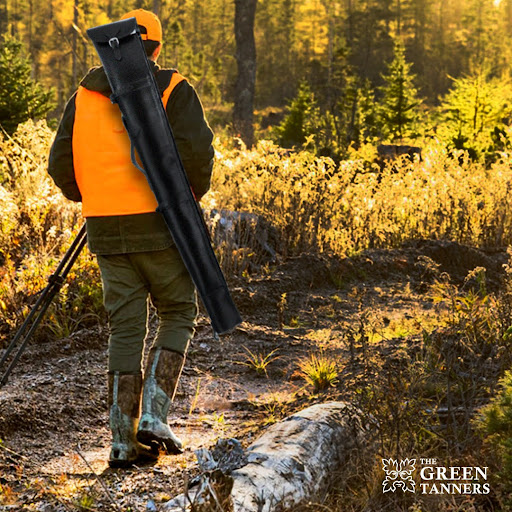Introduction to Leather Rifle Cases
Picture this: you’re heading out for a day at the shooting range or going on a hunting trip. You want to protect your prized possession, your rifle, while also looking stylish. Enter leather rifle cases – the epitome of both functionality and class. But when it comes to choosing between soft and hard leather cases, which is the right fit for you? Let’s delve into the pros and cons of each to help you make an informed decision. So, holster up as we explore the world of leather rifle cases!
Differences between Soft and Hard Leather Cases
Pros of Soft Leather Rifle Cases
Soft leather rifle cases offer a level of flexibility and ease of use that is unmatched. The supple nature of soft leather allows for easy customization to fit various rifle sizes and shapes, providing a snug and secure fit. This adaptability makes it convenient for storing rifles with scopes or accessories attached without worrying about a tight fit.
Another advantage of leather rifle cases is their lightweight construction, which makes them easier to carry around compared to bulkier hard cases. Whether you’re heading out for target practice or on a hunting trip, the lighter weight of soft leather cases adds comfort during transportation.
Additionally, soft leather offers better shock absorption than hard materials, providing an extra layer of protection against impact and scratches. This feature helps safeguard your rifle from minor bumps and dings while on the move or in storage.
Cons of Soft Leather Rifle Cases
Soft leather rifle cases offer a level of sophistication and style, but they come with their own set of drawbacks. One major downside is that soft leather is more prone to damage from impact or rough handling compared to hard cases. This could potentially leave your rifle vulnerable to dents or scratches during transportation.
Additionally, the lack of rigidity in soft leather cases may not provide as much protection against crushing forces or heavy objects accidentally falling on the case. If you often find yourself in situations where your rifle needs robust protection, a soft leather case might not be the best choice for you.
Moreover, soft leather can be more challenging to clean and maintain compared to hard cases. Stains and dirt may seep into the material easily, requiring more effort and specialized care to keep your case looking pristine. This extra maintenance could be a hassle for those who prefer low-maintenance storage solutions for their firearms.
Pros of Hard Leather Rifle Cases
Hard leather rifle cases offer unmatched durability and protection for your firearm. The rigid structure of hard leather provides excellent resistance against impact, ensuring that your rifle stays safe during transport or storage.
These cases are also more secure compared to soft options, as the sturdy exterior makes it harder for unauthorized access. Additionally, hard leather cases often come with reinforced locking mechanisms, adding an extra layer of security.
Furthermore, hard leather cases typically have a longer lifespan than soft ones. With proper care and maintenance, a high-quality hard leather rifle case can last for years without showing signs of wear and tear.
Another advantage of hard leather cases is their ability to shield your rifle from environmental elements like moisture and dust. This ensures that your firearm remains in pristine condition even in harsh conditions.
When it comes to protecting your valuable rifle investment, opting for a hard leather case can provide you with unparalleled durability and security.
Cons of Hard Leather Rifle Cases
Hard leather rifle cases, while offering superior protection, come with their own set of drawbacks. One downside is the weight; hard leather cases tend to be heavier than soft ones, which can be a burden when carrying your rifle over long distances or rugged terrain. Additionally, hard leather cases may not provide as much flexibility in terms of storage space compared to soft options.
Another con is the potential for scratches or dents on the case itself. Due to their rigid nature, hard leather cases are more susceptible to visible damage from accidental bumps or drops. This can detract from the overall aesthetic appeal of the case and potentially reduce its longevity.
Furthermore, hard leather cases may be bulkier and less convenient for transportation and storage purposes. Their rigid design can make them more challenging to fit into tight spaces or carry discreetly. These factors should certainly be considered when deciding between a soft or hard leather rifle case for your needs.
Choosing the Right Case for Your Needs
When it comes to choosing the right leather rifle case for your needs, there are a few factors to consider. Think about how you will be using the case. If you need something lightweight and easy to carry for short distances, a soft leather case might be the best option. On the other hand, if you require maximum protection for your rifle during travel or rough handling, a hard leather case could be more suitable.
Consider the size of your rifle as well. Make sure to choose a case that fits your firearm comfortably without being too tight or too loose. Additionally, think about any extra features you might need, such as additional pockets for accessories or adjustable straps for convenience.
Selecting the right leather rifle case is all about finding a balance between functionality and style. Take into account your unique requirements and preferences to ensure that you make the best choice for storing and transporting your valuable firearm securely.
Conclusion
Choosing the right leather rifle case depends on your specific needs and preferences. Soft leather cases offer flexibility, lightweight design, and ease of storage, making them ideal for casual shooters or those seeking a traditional aesthetic. Hard leather cases provide superior protection against impacts, water resistance, and added security features, perfect for frequent travelers or hunters needing maximum durability. Consider factors such as intended use, transport conditions, and required protection levels. Both options offer unique advantages catering to different shooting styles and requirements, ensuring your firearm remains protected while exuding timeless style.



